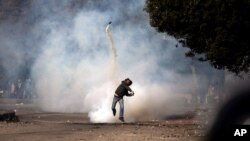CAIRO, EGYPT —
Egyptian President Mohammed Morsi has declared a state of emergency in three cities consumed with anti-government violence. In Port Said Sunday, six people were killed at the funerals of 30 people killed the day before in clashes over a court decision in a football tragedy. Elsewhere, rioters and protesters fought police in battles that have flared since Friday's second anniversary of Egypt's revolution.
President Morsi ordered a 30-day state of emergency with curfews in Port Said, Ismailia and Suez, three cities along the Suez canal that have erupted into anti-government violence over the past days.
Speaking on national television late Sunday, Mr. Morsi said he was taking the action to avoid bloodshed in the face of "rioters and outlaws."
The president had taken a low profile during these days of unrest, starting on the eve of the revolution anniversary and exploding Saturday with a court decision on a deadly football riot last year.
The coastal city of Port Said was reeling Sunday as more fighting erupted during the funerals of those killed in a burst of violence as rival football gangs, known as Ultras, and anti-government protesters turned the streets into a battleground. Port Said residents were appalled that their Ultras were blamed for the melee. More people died in fighting at the funerals, despite an increased security presence in the city.
In Suez, angry youths kept up deadly protests, mainly against the police and Muslim Brotherhood buildings. And in Cairo, riot police and protesters continued to trade tear gas and fire bombs on the streets leading into Tahir Square, two days after the nation marked the anniversary of the 2011 revolution.
Anger has largely turned toward President Morsi and his Muslim Brotherhood supporters, who protesters say have failed to bring political, economic or social justice since coming to power last year.
In response to the violence, Morsi said Sunday there was no alternative to national dialogue.
The president added that he was calling for a meeting Monday for political leaders to discuss the situation and define the general outline of the dialogue.
The Port Said violence erupted after a court handed death sentences to 21 people involved in a football riot that left 74 fans dead last year. Many blamed the government for not addressing what they said was security's role in failing to prevent the stadium disaster.
Ultras have long been suspicious of the police, and have been a strong force during the uprising against the old government, and in protests against the interim military rulers and the current leadership.
That people died at funerals for those killed during clashes prompted by death sentences imposed Saturday - which were themselves a response to deadly riots - has left many in Egypt both stunned and weary.

